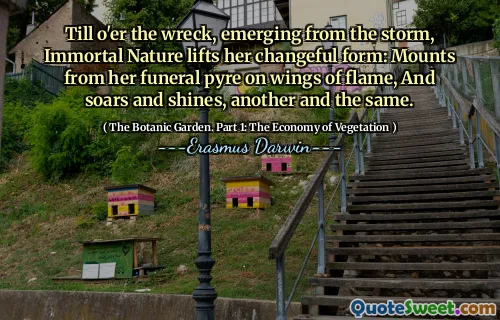
Till o'er the wreck, emerging from the storm, Immortal Nature lifts her changeful form: Mounts from her funeral pyre on wings of flame, And soars and shines, another and the same.
Erasmus Darwin's poetic lines encapsulate a profound perspective on the cycle of rebirth and the persistent resilience inherent in nature. The imagery of emerging from a storm and lifting a 'changeful form' suggests that nature is an ever-evolving entity, constantly transforming through upheavals and destruction. The phrase 'Mounts from her funeral pyre on wings of flame' vividly depicts destruction leading to renewal—fire here symbolizes both devastation and cleansing, paving the way for rebirth. The idea that nature 'soars and shines, another and the same' underscores a timeless continuity; despite apparent change and chaos, the essence of nature remains constant. This reflection aligns with ideas of transmutation and the eternal recurrence fundamental to natural philosophy. Darwin hints at a cycle where each end becomes a new beginning, and facilitate an understanding that growth often involves overcoming turmoil. In a broader philosophical context, this quote evokes hope—a reassurance that even in moments of destruction or despair, transformation is possible, and renewal leads to a brighter, elevated state. In modern ecological and scientific discourse, Darwin's words remind us of the resilience of life, how ecosystems adapt after disturbances, and how the natural world embodies perpetual renewal. It's a celebration of the indomitable spirit of nature, which refuses to be vanquished by storm or fire but instead, harnesses these forces to evolve and regenerate into something anew, mirroring life's innate capacity for rebirth and perseverance.






